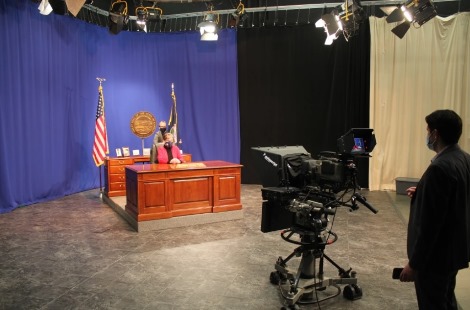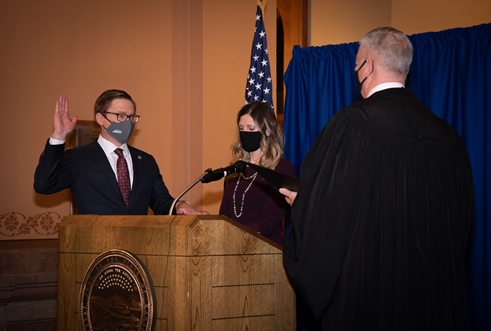
The governor’s state-of-the-state speech called for bipartisanship, cooperation in fighting the pandemic and, less realistically, expansion of Medicaid.
by Stephen Koranda, Kansas News Service
Topeka, Kansas — Gov. Laura Kelly continued to push for vigilance in the fight against the coronavirus and tried to combat skepticism of the vaccine as she laid out her goals on Tuesday for 2021.
The Democratic governor used her state-of-the-state speech to push for Medicaid expansion — a greater longshot than ever — and asked lawmakers for civility as she prepares for a legislative session where she faces an even more conservative Republican majority in the Kansas Statehouse.
Kelly mourned the more than 3,000 Kansans who have died of COVID-19. She urged people to continue to take precautions and get the vaccine.
“We are not out of the woods here. Not by a long shot. Our hospitals are strained and this virus continues to kill our loved ones and our neighbors,” she said. “But we will get through this crisis, with the vaccines.”
The governor’s speech normally happens in the packed Kansas House chamber. This year, because of the pandemic, it was the governor speaking to a camera in a Topeka TV studio.
Initial reports had shown Kansas lagging other states in vaccination rates. Kelly said that was because of delayed reporting and she pointed out that more recent reports have shown significant improvement.
Kelly said about 85,000 Kansans had been vaccinated so far. The state is still in the initial phase focused on people such as frontline health care workers. But she said the state needs help from Washington with the rollout.
“Much of our ability to distribute the vaccine is dependent on the federal government getting the vaccine to us,” she said.
She pointed to another challenge in fighting COVID-19: skepticism about the vaccine.
“Internet conspiracy theories. Complete nonsense,” Kelly said. “Make no mistake, the science behind the vaccines is solid.”
The governor argued that the pandemic also highlighted the need to expand Medicaid to more people. Her attempts to expand the program to cover more than 150,000 low-income Kansans have failed in the past and expansion seems unlikely this year with an even more conservative Legislature following the 2020 election.
“I’ll continue to push, over and over again, for what 38 states across the country have done — to expand Medicaid,” she said.
After the violence at the U.S. Capitol last week, the governor called for bipartisanship, asking lawmakers to work across the aisle and set an example for Kansans to follow.
“We’re being tested like never before,” Kelly said. “This year, working together isn’t simply something I want — it’s something we owe to the people of Kansas.”
Kelly walked a tight line regarding the riot, calling the events “sedition,” but not naming President Donald Trump specifically or blaming him, as some other politicians have.
The new Republican president of the Senate, Ty Masterson, struck a similar tone in his response, saying he hopes “we will be able to find common ground on issues where we can agree, and that we can have spirited, yet respectful, debate on the rest.”
But the two speeches showed contrasting visions for Kansas and hinted at the areas where Kelly and Republicans like Masterson will likely clash.
Masterson said Republicans will also pursue tax changes in response to the federal 2017 tax cuts.
“Kansas taxpayers should also be allowed the opportunity to take advantage of the federal tax cuts, and we must work to enact meaningful property tax reform,” he said.
That could put Republicans on a collision course with Kelly, who said in her speech that she’s opposed to tax cuts right now.
Republican leaders and Kelly have clashed over the state’s response to the pandemic, especially decisions that closed many non-essential businesses earlier this year. Masterson wants to reduce the chance of that happening again.
“The state should always be on the side of keeping businesses open, not letting unelected, unaccountable bureaucrats define who is essential,” he said.
Stephen Koranda is the Statehouse reporter for Kansas Public Radio and the Kansas News Service. You can follow him on Twitter @kprkoranda.
The Kansas News Service is a collaboration of KCUR, Kansas Public Radio, KMUW and High Plains Public Radio focused on health, the social determinants of health and their connection to public policy. Kansas News Service stories and photos may be republished by news media at no cost with proper attribution and a link to ksnewsservice.org.
See more at https://www.kcur.org/news/2021-01-12/gov-kelly-mourns-kansas-covid-19-losses-and-uses-state-of-the-state-address-to-ask-for-civility.

